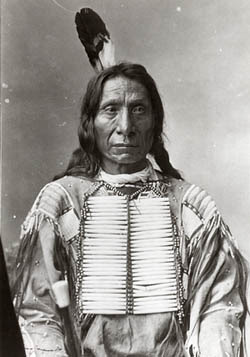By Allan B. Colombo, WMD Publisher
There's a real need for a rightful, truthful perspective when it comes to our nation's history. Because of the many controversies that have arisen over the past few decades involving the American Indian and the specter of racism, it's only appropriate that Western Magazine Digest (WMD) cover the issue in a non-biased manner.
Of course, there are those who believe it's in the best interest of all concerned not to cover the issue at all. To them, it's enough to cover the various aspects of the Old West that center on Cowboys, Cowgirls, Horses, Cattle, Lawmen, and the various advances made during the years of development. I might even agree with that, other than the fact that there are certain individuals in history that stand out, such as Chief Red Cloud, leader of the Oglala Lakota tribe.
Chief Red Cloud was born in 1822. Although no one knows the exact day he was born, history has certainly recorded the day he passed on. It was on December 10th, 1909, on a Friday. Famous people born on that day included Douglas Fairbanks, Jr. and Hermes Pan. Earlier that week 'Put on Your Old Gray Bonnet' by Haydn Quartet was all the rage and 'Beyond the Rockies,' directed by Sinister Cinema, was one of the most viewed movies of the year.
History records Chief Red Cloud as being one of the greatest American Indian leaders of all time as he led the Oglala Lakota tribe from 1868 to 1909. Along with the Dakota, the Oglala Lakota made up the two factions of the great Sioux tribe. Also called Teton, Chief Red Cloud's Lakota were known to be a hunting and warrior culture. Largely because of the introduction of the horse in the 1700's, the Lakota became the most powerful tribe on the plains by the 1850's.
Perhaps the Lakota's most significant claim to fame was the defeat of the United States Army in the Sioux Wars, which included the defeat of Brevet Major-General George Armstrong Custer's 7th Cavalry Regiment at the Battle of Little Big Horn (Custer's Last Battle). The Lakota's were also involved in several armed conflicts that led up to the Wounded Knee Massacre (The Battle of Wounded Knee Creek). Including the Fetterman Massacre of 1866. He's especially known for 'Red Cloud's War' that took place between 1866 and 1868 in Montana and Wyoming.
What attracted me to Chief Red Cloud was his alleged farewell address to the Lakota people before his death. I'd like to share it with you:
“My sun is set. My day is done. Darkness is stealing over me. Before I lie down to rise no more, I will speak to my people. Hear me, my friends, for it is not the time for me to tell you a lie. The Great Spirit made us, the Indians, and gave us this land we live in. He gave us the buffalo, the antelope, and the deer for food and clothing. We moved our hunting grounds from the Minnesota to the Platte and from the Mississippi to the great mountains. No one put bounds on us. We were free as the winds, and like the eagle, heard no man's commands. I was born a Lakota and I shall die a Lakota.“Before the white man came to our country, the Lakota's were a free people. They made their own laws and governed themselves as it seemed good to them. The priests and ministers tell us that we lived wickedly when we lived before the white man came among us. Whose fault was this? We lived right as we were taught it was right. Shall we be punished for t his? I am not sure that what these people tell me is true... Shadows are long and dark before me. I shall soon lie down to rise no more. While my spirit is with my body the smoke of my breath shall be towards the Sun for he knows all things and knows that I am still true to him.”
According to Terry Breverton, author of 'Immortal Last Words,' Charles A. Eastman recorded Chief Red Cloud's acclimation: “They made us many promises, more than I can remember, but they never kept but one; they promised to take our land, and they took it.”
In Conclusion, although there is little doubt that the United States Government of that time in history failed to keep their promises to the American Indian, we must all remember that no one alive today was there. No white man alive in this day and age had anything to do with the broken promises that took place at that time, and by the same token, not one American Indian alive today was victimized by anyone during the early days of American history.
If we are ever to heal the wounds of time that bind us all together as Americans, we must move forward by allowing the things of the past to remain in the past while assuring that history never repeats itself in the future.
--Al Colombo
--Al Colombo
Be sure to visit
THE TV WESTERN AND MOVIE FAN PAGE
on Facebook!















No comments:
Post a Comment
Thank you for your comment.